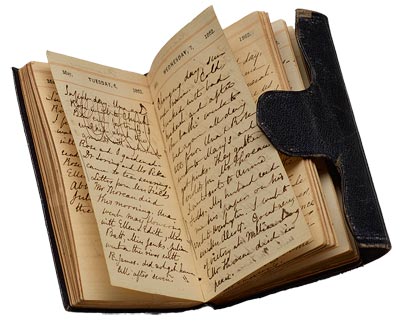Step 1: Please post your own reflection on the community blog by Friday, 11:55 p.m. Label your entry Week 2: add your own title. Make sure to cite anything you borrow or use in your post. Feel free to quote and paraphrase but give attribution when needed.
Step 2: Respond to two peers and provide feedback on his or her post in regards to content, voice, shortcomings, effectiveness, or your own experiences.
Both genders have taken up the act of writing about their lives on a continuing basis or in a consistent manner. Using a variety of reasons, journal keepers strive to document their lives, feelings, problems, moods, relationships in order to reflect on connections between actions, perspectives, and implications. Even though journals differ from diaries to some degree, feel free to use the terms interchangeably.

For example, Charlotte Brontë (1816–1855) used her her diary to escape stifling work as a schoolteacher; Tennessee Williams (1911–1983) poured out his his loneliness and self-doubt; John Steinbeck (1902–1968) explored his struggles with The Grapes of Wrath, and Bob Dylan (b. 1941) detailed his concert tour experiences.
For centuries, people have turned to private journals to document their days, sort out creative problems, help them through crises, comfort them in solitude or pain, or preserve their stories for the future.
As more and more writers turn away from the traditional notebook and seek a broader audience through web journals, blogs, and social media, it raises questions about this pervasive practice: What is a diary/journal? Must it be a private document? Who is the audience for the unfolding stories of our lives—ourselves alone, our families, or a wider group? Traditional self-narrative conventions dictate that a writer writes to reflect on him or herself in the moment/universe, so we begin our journey this semester talking about the most private type of writing self narrative: a journal.
1). Do you keep a traditional diary/journal? Why? Why not?
2). How do you feel about writing about yourself online? Should we share our personal dreams, thoughts, etc.. to the online platform? Is there a point that you can overshare so that you lose your sense of voice and purpose?
3). Why are people interested in reading other people's journals?
4). Do you think most diary writers write in stream of consciousness mode? If so, does this mean that only the writer should and can learn from his or her entries?
5). How much should a diary writer be concerned with spelling, organization, name dropping, etc..? Do you think these aspects change online?



No comments:
Post a Comment